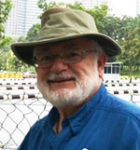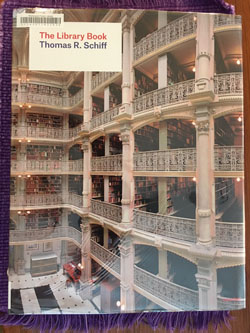The Library Book, A coffee table book that stirs the reader’s soul
Oliver B. Pollak

 RICHMOND, California — The Library Book, a 14½x11 3/8 coffee table book, weighs 6 lbs. I saw it in the new books section of the Richmond Public Library and “checked it out.” Then I checked it out at the circulation desk. I entered the house and my wife in some disbelief asked if I bought it, I responded, “At $80 I checked it out.”
RICHMOND, California — The Library Book, a 14½x11 3/8 coffee table book, weighs 6 lbs. I saw it in the new books section of the Richmond Public Library and “checked it out.” Then I checked it out at the circulation desk. I entered the house and my wife in some disbelief asked if I bought it, I responded, “At $80 I checked it out.”
Published by the Aperture Foundation in contains panoramic photographs and an Afterword by Thomas R. Schiff. Some foldout photos are four feet wide. The 360-degree view is a hundred-year-old technology starting with the Cirkut camera. Schiff states, “I’ve been using a film camera for so long, I don’t want to change.” His passions are architecture and photographs of great civic buildings.
Libraries take my breath away. The dome of the British Museum which housed the British Library until the library moved to St Pancras in 1997; The Bibliothèque Nationale in the Rue de Richelieu in Paris moved to new quarters named after François Mitterrand in 1996; and the Library of Congress, all employed the 360-degree arch, the dome, creating magical light, space and volume. Architecture’s greatest achievements honoring the power of the written word, national heritage and cultural aspirations. Styles and technology change. Candles, oil, gas and electric lights, plumbing, air movement, safety, wire and wireless communication, stone, brick and metals rise to create signature buildings, who’s grandiose style, like signature bridges, goes beyond its function.
Thomas Schiff hales from Cincinnati. His mother’s name adorns the Mary R. Schiff Library and Archives of the Cincinnati Art Museum. He also is chairman of Schiff Insurance. He has been a panoramic photographer since the mid-1980s and his several books include images of Cincinnati, Ohio, Parks, Indiana, and Kentucky.
Alberto Manguel is one of the most articulate spokespeople in the English language for the role of the library. His father was the Argentinian ambassador to Israel. Alberto was the go-to expert during the Iraq war regarding the looting of libraries, archives and museums. He holds Canadian citizenship and served as the Director of the National Library of Argentina in Buenos Aires. He books include A Reading Diary (2004), “A passionate Reader’s reflections on a year of books,” and A History of Reading (2014). There are 40,000 volumes in his personal library. His phenomenal Introduction to this book glows in praise for the role of the library in human existence, and darkly foreboding thoughts on the government commitment to continue appropriate funding.
This book covers 104 libraries thirty states. The West coast includes 16 in California, and one each in Oregon and Washington. New York, Ohio and Pennsylvania are represented by 8 libraries each.
Some people have checklists for baseball and football stadiums, golf courses, train stations, bridges, museums, clock towers, and other monumental architecture. My fetish includes visiting, reading and researching in libraries. I have been to the UC San Diego, UCLA, Huntington Library, Los Angeles, San Francisco, Berkeley, Stanford, Park City and Salt Lake City, Denver, Omaha, and the numinous New York Public Library. I have been to 16 of the libraries in this book. And of course I wrote A State of Readers: Nebraska’s: 63 Carnegie Libraries. But it’s not so much the grandeur of the building but the ideals it represents and its contents.
As a teenager I worked in the Baldwin Hills Public Library, and as a graduate student at UCLA Library. Libraries are places of repose and intellect. The words athenaeum, mechanics, merchants, mercantile, and Carnegie libraries dedicated to art, literature, science, stir my blood.
Manguel wrote, “A public library is the memory, the voice, and the face of the society that houses it.” Of Schiff’s art he observed, “With panoramic photography, you approach it a different way. Instead of trying to isolate a photograph, you look for an entire area where there is a good view in all directions.” And of personal libraries opined, “every library is autobiographical.” He didn’t need to convince me.
Jewish Book Month is coming up in October. Floor the bibliophile in your life with this six-pound book for Hanukah.
*
Pollak, an attorney and professor emeritus of history at the University of Nebraska Omaha, is a SDJW correspondent now based in Richmond, California. He may be contacted via oliver.pollak@sdjewishworld.com